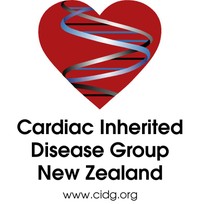Jackie Crawford
Cardiac Inherited Disease Coordinator
Cardiac Inherited Disease Registry N.Z.
Level 3 Cardiac Services Dept
Auckland Hospital
P.O. Box 92189
Auckland 1030
New Zealand

Cardiac Inherited Diseases Service

Postal Address
Contact Details
Phone (09) 307 4949 ext 23634
Mobile Clinical Coordinator: 021 825 389
Email jackiec@adhb.govt.nz
Jackie Crawford CIDG National Clinical Coordinator (Clinical Enquiries)
Louise Monson CIDG team support administrator (General Enquiries)
Cellphone: 021 825 389 (Clinical Coordinator)
Email: jackiec@adhb.govt.nz
Email Admin staff: cidgadmin@adhb.govt.nz
Website www.cidg.org.nz
E referrals - Auckland Hospital Cardiac Inherited Disease Service
Cardiac Arrhythmias
The heart rate is controlled by a complex electrical system within the heart muscle which drives it to go faster when you exert yourself and slower when you rest. A number of conditions can affect the heart rate or rhythm. Heart rate simply refers to how fast the heart is beating. Heart rhythm refers to the electrical source that is driving the heart rate and whether or not it is regular or irregular.
- Sinus rhythm is the normal rhythm
- Arrhythmia means abnormal rhythm
- Fibrillation means irregular rhythm or quivering of one part of the heart
- Bradycardia means slow heart rate
- Tachycardia means fast heart rate
- Paroxysmal means the arrhythmia comes and goes
- an electrocardiogram (ECG). This trace of the heart's electrical activity gives the diagnosis of the source of the arrhythmia. This is often normal at rest and more extensive testing is needed to try and catch the arrhythmia especially if it is intermittent.
- an Ambulatory ECG. This can be performed with a Holter monitor which monitors the heart for rhythm abnormalities during normal activity for an uninterrupted 24-hour period. During the test, electrodes attached to the chest are connected to a portable recorder - about the size of a paperback book - that's attached to a belt or hung from a shoulder strap.
https://www.healthpoint.co.nz/public/cardiology/cardiac-inherited-diseases-service/